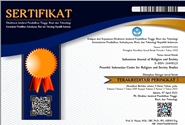Women’s Online Activism in Pakistan: Navigating Religious and Societal Constraints on Gender Identity
Abstract
This article analyses the disputed narratives regarding women's identity and public space in Pakistani society, as reflected in the ideological struggle between traditionalist and non-traditionalist power blocs. The primary objective of this research is to explore how group-based threat feelings shape the narrative and counter-narrative of gender rights, feminism, and religious identity in Pakistan. The study also aspires to analyze how the traditionalists perpetuate religious patriarchy, whereas non-traditionalists promote more political and social engagement of women. Based on Group Threat Theory as a conceptual lens, the study employs a qualitative case study methodology. It draws on social media data from Facebook, Twitter, and YouTube, complemented with newspaper, television, journal articles, and protest archives. Data were collected through thematic content analysis of social media, visual media, and grassroots activism, using search terms such as "Aurat March" and "anti-feminism Pakistan." The findings indicate an intense intergroup tension: women's rights organizations, civil society, and feminist foreign policy-supporting media voices, all non-traditionalists, believe women's liberty is under an existential threat due to entrenched religious patriarchy. They counter by demanding women's empowerment on such matters as body rights, marriage, dowry, and public participation. Alternatively, traditionalists view these demands as a cultural and symbolic threat to male authority, Islamic values, and morality. This results in militant counter-discourses, institutionalized resistance at the state level, and efforts to solidify conservative gender norms. The article finds that this intensifying group threat dynamic has grown into a bigger political and cultural conflict, setting gender identity politics in Pakistan but also across similarly structured postcolonial Muslim nations.
Keywords
Full Text:
PDFReferences
Ahmed, B. (2019). Combating Street Harassment: A Challenge for Pakistan. Women & Criminal Justice, 283-293.
Alexiev, A. ( 2005). Tablighi Jamaat: Jihad's stealthy legions. Middle East Quarterly, 3-11.
Anagol, P., & Grey, D. J. (2017). Rethinking Gender and Justice in South Asia, 1772–2013. Cultural and Social History, 419-427.
Azam, S., & Hong, Z. (2021). Breaking free from patriarchal appropriation of sacred texts: An Islamic feminist critique of Bol. Asian Journal of Women's Studies, 465-487.
Aziz et al., E. (2020). Why are Women Subordinated? The Misrepresentation of the Qur'an in Indonesian Discourse and Practice. Journal of International Women's Studies, 235-248.
Azeem, M. (2020, March 08). The Aurat March and Pakistan’s Struggle for Women’s Rights. Retrieved from International Center on Nonviolent Conflict: https://www.nonviolent-conflict.org/blog_post/the-aurat-march-and-pakistans-struggle-for-womens-rights/
Belford, N., & Roy, R. L. (2018). Negotiated voices: Reflections on educational experiences and identity by two transnational migrant women. Women's Studies International Forum, 24-31.
Bruck, J., & Baig, R. (2015, September 09). Social media helps Pakistani women reclaim their freedom. Retrieved from DW: https://www.dw.com/en/social-media-helps-women-in-pakistan-reclaim-freedom-in-public-places/a-18704356
Carangio et al., V. (2021). Racism and White privilege: highly skilled immigrant women workers in Australia. Ethnic and Racial Studies, 77-96.
Chakrabarti , U. (2018, January 04). 6 Indian Queens Who Fought Colonialism. Retrieved from Feminism in India: https://feminisminindia.com/2018/01/04/indian-queens-fought-colonialism/
Croucher, S. M. (2017, July 27). Integrated Threat Theory. Retrieved from Communication: https://oxfordre.com/communication/display/10.1093/acrefore/9780190228613.001.0001/acrefore-9780190228613-e-490#:~:text=ITT%20proposes%20that%20prejudice%20and,negative%20stereotype%2C%20and%20intergroup%20anxiety.
Cook, N. (2001). The discursive constitution of Pakistani women: the articulation of gender, nation, and Islam. Atlantis , 31-41.
Fanon , F. (2008). Chpater 06. In Fanon, Black Skin, White Masks. New York: Grove Press.
Gouws, A. (2018). #EndRapeCulture Campaign in South Africa: Resisting Sexual Violence Through Protest and the Politics of Experience. Politikon, 3-15.
Grünenfelder, J. (2013). Discourses of gender identities and gender roles in Pakistan: Women and non-domestic work in political representations. Women's Studies International Forum, 68-77.
Guerin, C., & Shah, E. M. (2020). Public Figures, Public Rage: Candidate abuse on social media. London: Institute for Strategic Dialogue.
Gunn, J. T. (2020). Do Human Rights Have a Secular, Individualistic & Anti-Islamic Bias? Daedalus, 148–169.
Hernandez, J. (2022, May 18). The U.S. men's and women's soccer teams will be paid equally under a new deal. Retrieved from National Public Radio: https://www.npr.org/2022/05/18/1099697799/us-soccer-equal-pay-agreement-women#:~:text=The%20U.S.%20men's%20and%20women's,under%20a%20new%20deal%20%3A%20NPR&text=Hourly%20News-,The%20U.S.%20men's%20and%20women's%20soccer%20teams%20will%20be%20paid,prize%20
Hussin, I. R. (2016). The Politics of Islamic Law Local Elites, Colonial Authority, and the Making of the Muslim State. Chicago: University of Chicago Press.
Hussein, N. (2023). Asian Muslim women's struggle to gain value: The labour behind performative visibility as everyday politics in Britain. Women's Studies International Forum, 1-8.
Jafri, Q. (2021). The Pashtun Protection Movement (PTM) in Pakistan. Washington, D.C: International Center on Nonviolent Conflict.
Jatoi, B. (2015). Violence Against Women (VAW) Annual Report 2014. Islamabad: Aurat Publication and Information Service Foundation.
Kangaspunta et al., K. (2018). Global Report on Trafficking in Persons 2018. Vienna: UNITED NATIONS OFFICE ON DRUGS AND CRIME.
Kaur, R., & Kapoor, T. (2021). The Gendered Biopolitics of Sex Selection in India. Asian Bioeth Rev, 111–127.
Kassam, Z. (2007). Islamic Contestations: Essays on Muslims in India and Pakistan by Barbara D. Metcalf. Journal of the American Academy of Religion, 194-197.
Khan, A., & Saeed, H. (2000). Legalised Cruelty: Anti-women laws in Pakistan. In J. M. Radlett, No Paradise Yet The World's Women Face the New Century (pp. 119-136). London: Zed Books.
Loureiro, M. (2019). Debating empowerment: men’s views of women’s access to work in public spaces in Pakistan-administered Kashmir. Contemporary South Asia , 531-548.
Mannell, J. (2022, April 25). How colonialism is a major cause of domestic abuse against women around the world. Retrieved from The Conversation: https://theconversation.com/how-colonialism-is-a-major-cause-of-domestic-abuse-against-women-around-the-world-179257
N/A. (2020, September 14). Minorities in Pakistan. Retrieved from Facebook page: https://www.facebook.com/MinortiesofPakistan/posts/2051769411621787
N/A. (2020, March 04). Pakistan: Amnesty International stands with Aurat March. Retrieved from Amnesty International: https://www.amnesty.org/en/latest/news/2020/03/pakistan-amnesty-international-stands-with-aurat-march/#:~:text=%E2%80%9CAmnesty%20International%20unequivocally%20supports%20the,political%20representation%20and%20economic%20opportunities.
N/A. (2022, March 08). Aurat March vs Haya March - Maqsad ek lekin husool keliye dharay do. (F. Rabani, Interviewer)
N/A. (2022, May 10). Feminist News. Retrieved from Facebook Page: https://www.facebook.com/feministnews.us/posts/389644929875339
N/A. (2022, May 22). Fight the Patriarchy. Retrieved from Facebook page: https://www.facebook.com/FightThePatriarchy/posts/334197868853419
Naz, K. (2022, February 17). Aurat March ya Haya March ? - Nikah Khatam Karo. (M. Zubair, Interviewer)
Nazneen, S. (2019). Introduction: contentious women's empowerment in South Asia. Contemporary South Asia, 457-470.
Qureshi, Z. (2020, May 12). increase in crimes against women in Pakistan in January-March. Retrieved from Gulf News: https://gulfnews.com/world/asia/pakistan/200-increase-in-crimes-against-women-in-pakistan-in-january-march-1.71455870.
Rehman, I. (2020, September 24). A brutalised society. Retrieved from Dawn: https://www.dawn.com/news/1581352/a-brutalised-society
Rehman, I., & Hanley, T. (2022). Muslim minorities’ experiences of Islamophobia in the West: A systematic review. Culture & Psychology, 139-156.
Rodriguez et al., A. R. (2022). Changing public opinion about gender activates group threat and opposition to feminist social movements among men. Group Processes & Intergroup Relations, 811-829.
Rouse, S. (2004). Shifting Body Politics: Gender, Nation, State in Pakistan. New York: Women Unlimited.
Rashid, T. (2023). Radical Islamic Movements: Gender Construction in Jamaat-i-Islami and Tabligh-i-Jamaat in Pakistan. Strategic Analysis, 354-376.
Sheldon, K. (2018, June 27). Women and Colonialism. Retrieved from Oxford Bibliographies: https://www.oxfordbibliographies.com/display/document/obo-9780199846733/obo-9780199846733-0067.xml
Safina. (2020, September 19). Maulana Tariq Jameel Said Co-Education Promotes Immorality And People Are Reacting. Retrieved from Reviewit.pk: https://reviewit.pk/maulana-tariq-jameel-said-co-education-promotes-immorality-and-people-are-reacting/
Saigol, R. (1996). Knowledge and identity : articulation of gender in educational discourse in Pakistan. Lahore: ASR Publications.
DOI: https://doi.org/10.36256/ijrs.v7i1.442
Refbacks
- There are currently no refbacks.
Copyright (c) 2025 Indonesian Journal of Religion and Society

This work is licensed under a Creative Commons Attribution-NonCommercial 4.0 International License.
Indonesian Journal of Religion and Society (IJRS) Is Indexed By:

Indonesian Journal of Religion and Society (IJRS) is distribute under Creative Commons Attribution-NonCommercial 4.0 International License.













